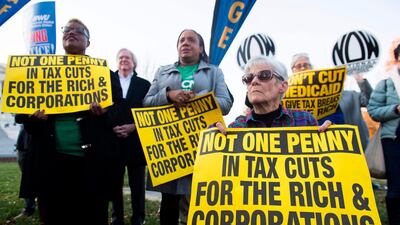There were three significant events for financial markets to digest last week, two broadly expected and one a surprise, but all of which will continue to have relevance in 2018 and probably beyond.
The first of these is that Opec decided to extend its existing production cuts for the whole of 2018 from their initial end in the first quarter of next year. The producers' bloc did keep the door open for changes and agreed to re-evaluate market conditions at their next meeting in June, where cuts could potentially be eased (or deepened if the market moves in the wrong direction).
The extension of the deal was widely anticipated by markets, which responded positively, if not with much exuberance, to the announcement. Brent futures continue to hold above US$60 a barrel while WTI is nearing in on that target.
The extension of the cuts keeps the oil market status quo in place; a gradual drawing down of inventories for the fourth quarter, positive conditions for non-Opec producers (particularly in the US) and heavy scrutiny to be placed on compliance levels next year.
While there was a relatively wide assumption that the cuts would be rolled over, there is still scepticism that compliance will hit 100 per cent across Opec producers and their partners.
Even if the cuts were adhered to fully, the impact on oil balances would mean a small deficit would emerge from the second quarter of next year, but of a degree that would not allow any flexibility for production from month to month. However, prices should still be higher on average in 2018 compared with 2017. The combination of higher prices and higher output will be a positive contributor to Opec economies next year unless there is a major price correction downward.
______
Read more from Tim Fox:
Central banks take the driving seat on monetary policy normalisation
Equities have outperformed other assets classes in 2017
Uncertainty over the Fed chair's future leaves markets on edge
______
The second key event was the relatively swift progress of the Republican tax reform bill through the US Senate, by a margin of 51-49, opening the door to the probability of tax reform legislation being signed into law before the end of the year.
Differences between the Senate version and the House version will still have to be ironed out in the coming weeks on issues, such as the taxation of business income to child tax credits, but the one common factor in both versions is the cut in corporate taxes to 20 per cent from 35 per cent.
The Senate version still sees this coming into effect in 2019 against 2018 for the House version, however, which could make a big difference to how quickly the reforms would translate into stronger economic growth.
For the most part expectations are for only a modest boost to growth overall as a result of tax reform being passed, but given that the economy is already virtually at full capacity with the unemployment rate at 4.1 per cent, any additional boost would still potentially have repercussions particularly in the realm of monetary policy.
Through 2017 the Fed has been operating on the assumption that it will raise interest rates three times this year and a further three times in 2018. Although Fed officials have recently expressed some concerns that the current lull in inflation may not be as transitory as previously thought, the probability that the economy will now get another boost is more likely to reinforce the likelihood that they deliver on their ‘dot plot’ forecasts next year, with some analysts projecting even more hikes.
The stock market understandably rallied in anticipation of the tax reform bill being passed, setting new records in the process. However, the markets were then caught off guard by the third major development of the week, selling off sharply on political events in Washington as the Muller investigation brought charges against President Trump’s first national security adviser Michael Flynn.
Flynn’s guilty plea to relatively minor charges was significant as it implies that in return he could implicate Donald Trump’s inner circle in the collusion suspected of between the Trump campaign team and Russia.
Where this story will end is still uncertain, but the odds have probably lengthened on the chances of Mr Trump seeing out his whole term. 2017 is certainly ending with economic events that will have significant implications for financial markets next year, but it is perhaps the political developments that could have more long lasting ramifications.
Tim Fox is chief economist and head of research at Emirates NBD


